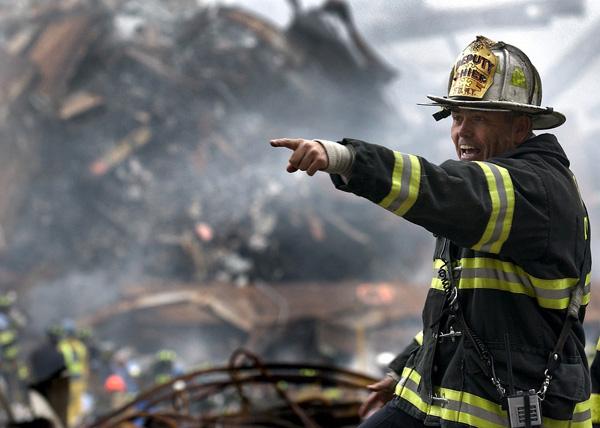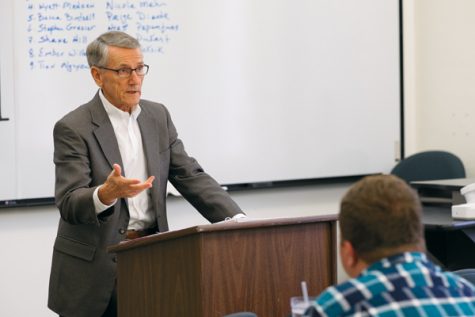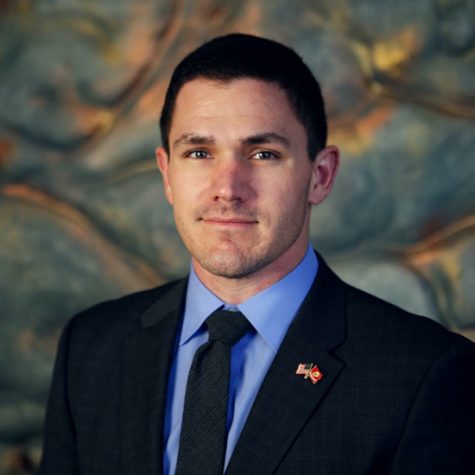9/11; 15 years later, remembering the worst day

FDNY Firefighter at ground zero. Photo courtesy of pixabay.com
15 years ago, a teenaged boy walked into the agriculture science building of the Adrian High School, in Adrian, Missouri, a small town of less than 3,000 an hour south of Kansas City, Missouri.
The boy sat down in front of one of the several tables lined in a large u-shape. As his classmates began to slowly filter in, discussing all manner of teenaged topics: upcoming dances, football games and dreaded classes with strict teachers, he looked toward the back of the room to see his teacher, Mr. Lentz, walk out of his office.
Mr. Lentz was one of those stereotypical teachers you see in every school. He was always smiling, outgoing and genuinely interested in the lives of his students. This day though, he did not project the kind of enthusiasm one might expect. He stepped out of his office and gazed around at the students, as if he were just seeing them for the first time. His eyes narrowed and gave the impression the mind behind them was jumping from thought to thought a mile a minute.
As the students took their seats, taking notice of Mr. Lentz’s unusual behavior, their voices hushed. After what seemed like an eternity, Mr. Lentz walked to the front of the class with his eyes down, as if he were afraid he would step on something if he weren’t careful. Standing before the class, he simply asked, “does everybody know what’s happened?”
The students looked at each, curious if anyone knew what Mr. Lentz was talking about. When they had concluded their ignorance amongst themselves, Mr. Lentz sighed deeply and scanned the room as he muttered, “this morning, a group of people flew two planes into both towers of the World Trade Center. The buildings collapsed.”
That was the exact moment I learned about the terrorist attack on the World Trade Center. That was the exact moment the phrase “9/11” took on a new meaning for me, forever.
Looking back now, 15 years later, I’m 28 years old and the memory is just as strong as it was the day after. I still remember coming home and not knowing how to act, or what to feel. I knew there was something inside of me welling up and getting closer to bubbling over, but I just couldn’t put my finger on it.
It took years to figure out, but now I can look back and tell you honestly: I was scared. I felt vulnerable. The idea that something like that could happen was unthinkable. It was like staring at the hand of magician who should be holding a quarter, only to find it empty. I simply could not process the information.
Over the years, my fear turned into anger, and as it has a way of doing, my anger turned into hatred. I despised the people who did this, and that anger led me to join the Marines in early 2008. Less than eight months after arriving to boot camp, I was standing on Iraqi soil in desert camouflage utilities, anxious for what lay ahead.
Over the course of the next eight years, I saw life changing scenes and performed perspective-altering tasks. I returned from Iraq, only to turn around a year later and arrive in Afghanistan. I spent my military career searching for redemption, but more than that, I was searching for answers.
To this day, I still can’t tell you why someone would kill so many people in such a manner. The hatred they must have felt to find it necessary to give their own lives in the pursuit of taking others is a notion I can’t even begin to comprehend. Then again, maybe I can.
All these years later though, I can tell you this: if there is an answer to that kind of hatred, it’s such a complicated answer that I wonder if it’s even worth discovering. We can blame it on whoever and whatever we want to, but in the end we’re only trying to make sense of it, forgetting the fact that sometimes things simply don’t make sense.
Whenever I think about the World Trade Center, and that day, a certain image always comes to mind, an image the media refers to as “the falling man.” Perhaps you’ve never heard of this image, or even seen it. Should this story prompt you to search for the image, I feel a responsibility to inform you that it is quite possibly the most gut-wrenching photo you’ll ever see.
With his head oriented toward the ground, a man was photographed moments after he leapt from the World Trade Center. The image invokes several thoughts, to me at least. I wonder what must have been going through his mind as he fell. Certainly he was terrified and felt he had no other choice but to end his life on his own terms. But what was he thinking about? His wife? His children? His family? What goes through one’s mind when they know they’re going to die in a matter of seconds?
These thoughts are tragic, and maybe someone will read this and be offended I would even bring this topic up. I don’t consider my thoughts to be offensive in this case though, because trying to imagine what this man was thinking gives me a perspective on my life I don’t have the majority of the time.
In seeing this man as he is in the photo, I come to see the pettiness of so many of the worries I allow to haunt me. I come to appreciate my life and the country I live in, and how delicate the balance is between life and death.
Let us not forget the one thing that matters above all else: people died. Whatever the reason, whatever the motivation and whatever the result, a lot of people died who didn’t have to. Try and see past the fact that you’re angry and simply see the truth, and the truth is, at least in my case, that I regret their loss. I only wish I could have done something more to stop it, because as I’ve learned, there’s nothing you can do to fix it.
Hold your family closer tonight and cherish the fact that you have all that you do. Spend time with your friends, take a break from studying and just take a moment to soak in your surroundings, because life is beautiful. Life has a beauty to it we often forget, and it’s only when someone loses it that we remember how much it means to us.
Matt Eidson is the opinion editor for The Dakota Student. He can be reached at stewart.eidson@und.edu








